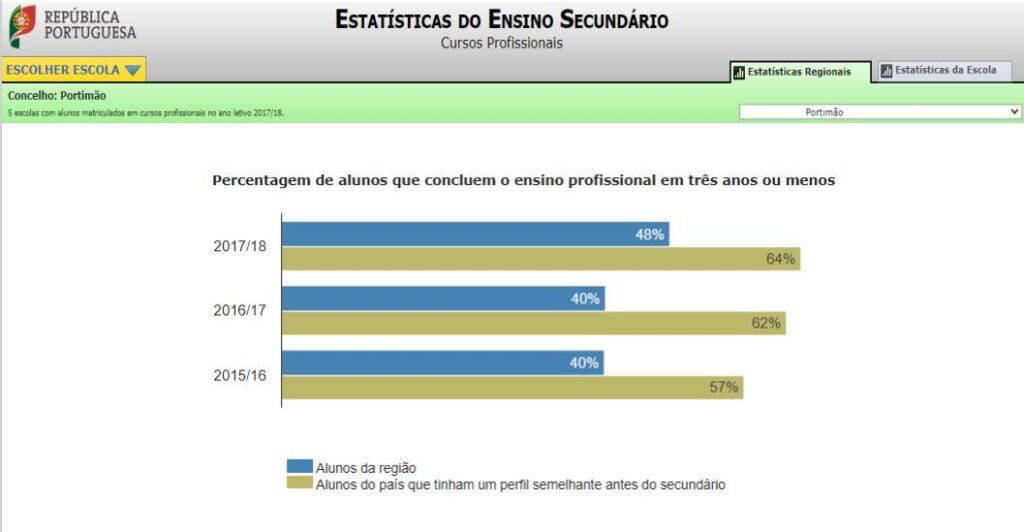A Training Workshop dedicated to Vocational Education took place in Portimão in recent weeks, at the initiative of the Training Center Associação de Escolas Portimão & Monchique. The workshop was attended by a group of course teachers from the three secondary schools in the city, namely António Aleixo, Bemposta and Manuel Teixeira Gomes.
Taking as a starting point the need to promote the improvement of the results of students in vocational education (cf. infoschools.mec.pt), and bearing in mind the explicit recognition in the current legislation about the importance of the figure of the Course Director in Vocational Education at secondary level, the group of participants was challenged to build concrete and contextualized improvement proposals, to be implemented in different schools of the county.
In the first moment of this action, the group reflected on the main issues that currently affect professional courses (for example, vocational guidance for entry into secondary education, inclusive education, autonomy and curriculum flexibility), analyzing the characteristics of the students who attend this important modality of training and debating aspects related to the structure and dynamics of the functioning of professional courses in secondary schools – namely aspects related to Curriculum Management, Training in the Work Context and the Final Test of Professional Aptitude.
In a second moment, a very diversified set of action proposals to be implemented in a local context was then elaborated.
Part of the proposals presented was aimed at the need to introduce changes at the level of school organization: creation of the coordinating council for vocational education, as opposed to the current one-person position of coordinator of professional courses; creation of course coordinator teams, which ensure the use of experience accumulated over time in certain areas of training; creation of collegiate structures for launching and monitoring the experiences of training in the work context of students, exploring other modalities besides internships, more in line with courses aimed at professions exercised in a liberal regime.
Another set of proposals dealt with dimensions related to the need to strengthen relations between the school and the different stakeholders, examples of which are local authorities and representatives of the business world, such as the involvement of representatives from the world of work in vocational guidance activities and information about professional courses aimed at final year students in primary education, or the involvement of stakeholders in the construction and implementation of the curriculum for each course to ensure a better adjustment to the reality of the world of work, promoting the use of the workplace as a true learning context.
Another proposal involved the involvement of entities from the wider educational community, such as local authorities, in activities to promote and enhance professional education, examples of which are the prizes to be awarded, in each school year, to the best Final Exams of Professional Aptitude or to other projects of merit developed by students.
Proposals were also presented related to the functioning of educational teams, made up of teachers and trainers, who accompany a given professional course: promoting interdisciplinarity and project work in the development of the curricular project for each class; use digital platforms, such as Google Classroom, to improve communication between teachers and between teachers and students, in situations of classroom teaching as in distance learning.
Finally, proposals were presented that aim to improve the monitoring and evaluation processes of vocational education: implementation of quality systems applied to the processes and results of vocational education, namely using the European Quality Assurance Reference Framework for Education and Professional Training (EQAVET Framework); to complement the internal evaluation processes, already being implemented in each secondary school, with inter-school processes, or even municipalities, to monitor professional education.
The trainer responsible for running the Training Workshop, Isabel Quirino, noted the high quality of the set of proposals presented, highlighting the coincidence that her presentation was registered at the time when the European Commission has just presented the most recent recommendation on education and training professional, a recommendation that, to vocational education, attributes a fundamental role with regard to the employability of younger people, social justice and the resilience of populations (Osnabruck Declaration, November 30, 2020 - access the Osnabrück Declaration here).
Teachers Gabriela Magalhães and Lara Fernandes, from Escola Secundária da Bemposta participated in the Training Workshop; Sandra Guerreiro, Natália Pereira, Ricardo Teodósio and Paula Teixeira, from ES Manuel Teixeira Gomes; Paulo Tendinha, Maria João Silva, Rita Ferreira, Luís Mendes, Cristóvão Cerqueira, Pedro Lobato and Carlos Condeço, from ES Poeta António Aleixo.




















Comments